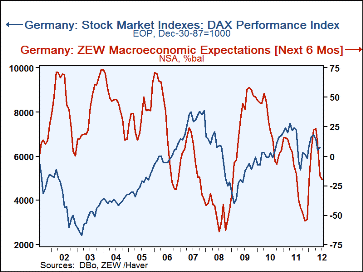 Global| Jul 17 2012
Global| Jul 17 2012German Zew Index Backtracks
Summary
This month's Zew survey continues a trend that has been in play for several months. Sentiment remains quite low and this month it is moving lower. The current situation has slipped for the second month in a row. And in those two [...]
 This month's Zew survey continues a trend that has been in play for several months. Sentiment remains quite low and this month it is moving lower. The current situation has slipped for the second month in a row. And in those two months, the value of the positive current reading has been more than halved from +44.1 to +21.1.
This month's Zew survey continues a trend that has been in play for several months. Sentiment remains quite low and this month it is moving lower. The current situation has slipped for the second month in a row. And in those two months, the value of the positive current reading has been more than halved from +44.1 to +21.1.
The current reading is still relatively firm, standing higher only 25% of the time. One year ago it was at a reading of 90.6 and was higher only 0.9% of the time. Despite some continuing strength, the slippage is clear.
The expectations index is lower this month; its level is higher 88% of the time, thus its current level already is low. It is at about the sale position it was one year ago although it had improved it has slipped again. Two months ago expectations were at a value of 10.8 it is now at -19.6. The view that Germany could rise while the rest of the Zone floundered is now a thing of the past.
Very clearly the ‘weak e-Zone’ is pulling down the strong ‘e-Zone’ and it is not working the other way around. Indeed, Germany itself is keeping austerity pressures full bore on the weaker nations in need of adjustment and policy changes. This has adverse implications for the creditworthiness of the strong Zone members their government units as well as their top economic transactors.
Germany’s reluctance to help more as well as to be more flexible is keeping the e-Zone weak and making it weaker-still. In turn, that is also making Germany weaker as it is also a part of the Zone. The lack of any consensus to actually boost the e-Zone remains a clear risk to growth up and down the line from weak to strong. As in the US the central bank has probably already done more than it should even though there are still calls for it to do amore.
While some recent data have showed some stronger data for Germany and even for industrial output in the Zone these would appear to be unsustainable country and as well as Zone-wide moves.
Europe is weakening and the weakness is spreading and so are the risks and the Fed Chairman has reminded us of that today as well as of the heightened uncertainty.
| ZEW Economic Index For Germany | |||||||
|---|---|---|---|---|---|---|---|
| Level of Zew Index | Averages | ||||||
| Jul-12 | Jun-12 | May-12 | Yr Ago | 3Mo | 6Mo | 12Mo | |
| Current | 21.1 | 33.2 | 44.1 | 90.6 | 32.8 | 36.2 | 36.8 |
| Expectations | -19.6 | -16.9 | 10.8 | -15.1 | -8.6 | 4.2 | -19.5 |
| Percentiles | |||||||
| Current | 62.9 | 69.3 | 75.1 | 99.5 | |||
| Expectations | 28.9 | 30.6 | 48.7 | 31.8 | |||
| Percentiles are readings in this period as percentile of the full range of values back to 1/92 | |||||||
| Count Percentiles: Reading is Stronger than this 'XXX' Percent of the Time... | |||||||
| Current | 25.8% | 20.7% | 13.4% | 0.9% | |||
| Expectations | 88.0% | 86.2% | 68.8% | 88.2% | |||
Robert Brusca
AuthorMore in Author Profile »Robert A. Brusca is Chief Economist of Fact and Opinion Economics, a consulting firm he founded in Manhattan. He has been an economist on Wall Street for over 25 years. He has visited central banking and large institutional clients in over 30 countries in his career as an economist. Mr. Brusca was a Divisional Research Chief at the Federal Reserve Bank of NY (Chief of the International Financial markets Division), a Fed Watcher at Irving Trust and Chief Economist at Nikko Securities International. He is widely quoted and appears in various media. Mr. Brusca holds an MA and Ph.D. in economics from Michigan State University and a BA in Economics from the University of Michigan. His research pursues his strong interests in non aligned policy economics as well as international economics. FAO Economics’ research targets investors to assist them in making better investment decisions in stocks, bonds and in a variety of international assets. The company does not manage money and has no conflicts in giving economic advice.
More Economy in Brief
 Global| Feb 05 2026
Global| Feb 05 2026Charts of the Week: Balanced Policy, Resilient Data and AI Narratives
by:Andrew Cates






